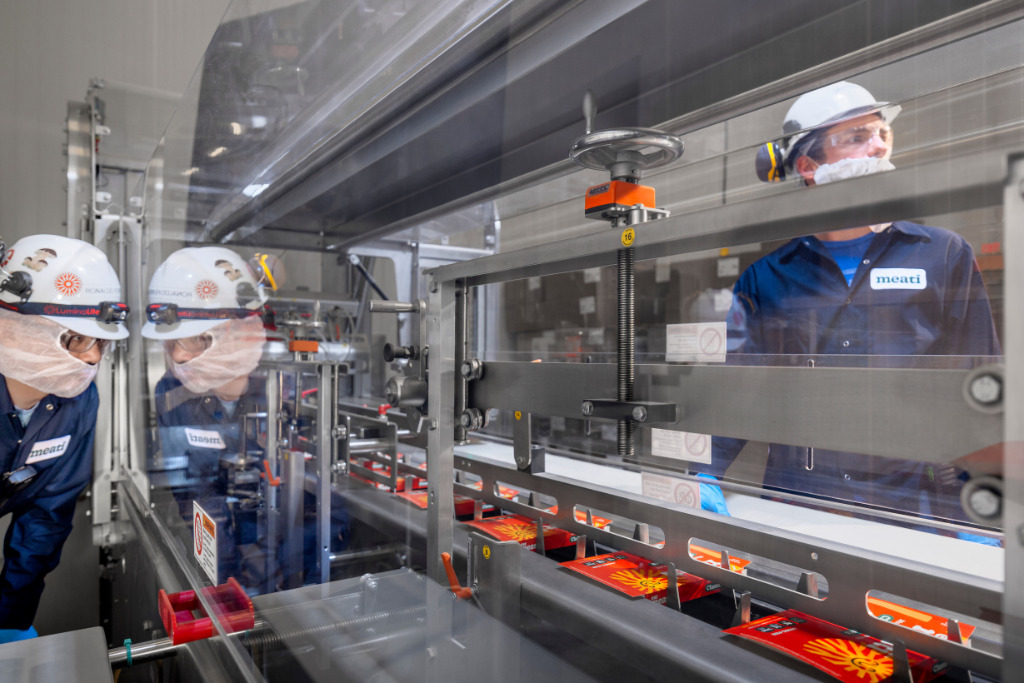Magical Mushroom Root: Meati Receives Patent for Mycelium Ingredient As AI Study Discovers Health Potential
7 Mins Read
US mycelium meat producer Meati has received a patent for its MushroomRoot™ ingredient with exclusivity until 2039. Additionally, the company shared early results of a promising AI-led study into the health benefits of its mycelium strain.
After applying for the patent in 2018, Meati received confirmation from the United States Patent and Trademark Office (USPTO) last month, giving the mycelium meat maker exclusivity over the use of the Neurospora crassa strain until 2039. The ingredient, which it commercially calls ‘MushroomRoot’, is the base for its vegan whole-cut steaks and cutlets.
“The patent is a culmination of our years-long journey to have our foundational work with MushroomRoot and its wide-ranging food applications acknowledged and protected,” said Meati co-founder and CSO Justin Whiteley. When asked about the five-year wait, he told Green Queen: “Along the way, it was definitely suggested that we narrow the breadth of what we applied for, but we maintained our position to give us the broadest protection possible.”
Meati has been embroiled in a legal battle with fellow mycelium meat producer The Better Meat Co since 2022. The former accused the latter of IP infringement after The Better Meat Co received a patent for its fermentation tech. In response, The Better Meat Co accused Meati of undermining its IP and thus ruining its fundraising efforts.
The legal dispute is still ongoing. “We are not commenting on ongoing litigation beyond restating that we are confident in our case,” noted Whiteley. He reiterated that the patent was “a terrific, long-awaited validation of the early work done by our co-founders”.
An AI-led assessment of health benefits

In addition, Meati completed a study into the potential health benefits of its mushroom root ingredient using AI company PIPA’s LEAP tool. The PIPA partnership was announced in July following the establishment of the Meati Science Advisory Board. The results reveal that Meati’s now trademarked ingredient contains some “exceedingly rare/non-existent” compounds in food that present “pointed” health benefits, alongside benefits from mycelium’s whole-food nutrient density, which could address “prevalent nutritional deficiencies” and enhance “cardiovascular health”.
Whitely explained that PIPA, which stands for Process Integration and Predictive Analytics, has developed its own Data Analytics Platform that allows for “maximum flexibility and agility to allow the ingestion of many disparate and massive data resources to learn from and be processed in a way that leverages years of experience and the latest in AI technologies”.
“On top of this tech stack sit several platforms and SaaS-based tools to lead best-in-class innovation within food, nutrition and the life sciences, including LEAP for Life Sciences R&D, OES for raw omics data, and Ingredient Profiler to compare, improve and design ingredients to make a product more healthy and sustainable,” said Whiteley.
The PIPA platform integrates public and third-party data to build an integrative knowledge graph. AI pipelines are then applied to find existing or predicted connections and unlock latent knowledge that scientists can use for their project aims.
“We essentially are teaching the machines to think like humans, correlate millions of curated published papers and datasets, and summarise them via LLMs [large language models] to ensure the data is shareable, explainable and actionable,” explained Whiteley. “With these tools, PIPA has completed over 65 programs, increasing hit rates up to 35x higher than traditional research methods, which are typically <1% – [thus] significantly reducing costs and time needed in the lab or trials to verify and validate.”
The LEAP tool identified 14 key compounds in Meati’s MushroomRoot, which can work together or independently to address gaps in achieving optimal nutrition and improving health. These gaps can occur when these compounds, which are essential dietary nutrients, are consumed in lower amounts than required for maintaining good health and performance.
Cardiovascular health was the top health opportunity identified by LEAP, which is an important finding given that heart disease is the leading cause of death in the US, with one in five Americans dying from the condition. As for the aforementioned rare compounds that were identified, Meati is keeping details under wraps until further research is done.
Leveraging the knowledge to improve alt-meat

“We knew MushroomRoot was nutrient-dense based on our early research to find a species ideal for food,” Whiteley recalled. “However, we did not know exactly what benefits we could claim to make it easier for consumers to understand why it is unique. In just The PIPA findings unlocked – in a month versus [over[ years – known associations between compounds found in MushroomRoot and health benefits, as well as provided direction for future research.”
Asked how Meati planned to apply the knowledge gained from the AI-led process, Whiteley said the goal is to “crystallise what health benefits are yielded by regularly consuming Meati”, and sharing this information with its customers. “Ultimately, we want to make claims about specific benefits, short- and long-term, addressing specific health needs and also overall health and longevity,” he added.
“PIPA’s findings in this initial research using AI greatly accelerates our understanding of the wide range of public health benefits possible from regular consumption of mycelium as a whole food,” said Dr Roberta Holt, a member of the UC Davis Department of Nutrition and the Meati Science Advisory Board. “The unexpected discovery of additional potentially beneficial compounds that are quite rare further emphasises the importance of integrating AI into research to accelerate our scientific understanding of the complexity of whole-food products like Meati, and their potential role in human health.”
Meati is among a growing number of alt-protein brands leveraging AI to their benefit. NotCo has been using AI to develop its plant-based alternatives for years, Singapore’s Howw Foods employs the tech to make a vegan powdered egg, and Bel Foods has partnered with California’s Climax Foods to make plant-based products. Elsewhere, food and machine learning experts have unveiled an AI-led texturising startup, and two other firms are using AI to find superior protein-producing fungi strains. And in a link-up similar to Meati and PIPA’s, Danone is working with Californian AI firm Brightseed to discover hidden nutrients and compounds in plant crops.
“Receiving our patent just after our AI initiative highlighted MushroomRoot’s significant potential for consumer health benefits is truly remarkable, as they together validate our long-term vision of creating not only new food categories, but making existing foods more nutritious,” added Whiteley.
Meati’s recent developments and future plans

The news comes a couple of weeks after Meati opened its D2C marketplace featuring a subscription service that offers customers a new alt-meat product made with MushroomRoot every month. Whiteley said people can expect to see novel innovations by the end of the year, and Meati has hinted that the versatility of its fungi ingredient enables “limitless application in products like whole-cut steaks, ground meats, seafood, powders and shelf-stable foods”.
“What is exciting about MushroomRoot and its nutrient density is that it’s truly a platform,” Whiteley stated. “Meati is the first demonstration of the incredible food it can create, and we’re excited to introduce distinct functions and formats down the road, making it even easier to get Meati into other cultures, meals and moments.”
Meati restructured last month after laying off 10% of its workforce and shuttering its pilot plant in Boulder, Colorado, with the brand explaining that it needed to “be nimble and focus on near-term profitability”. While the staff cuts saw 30 employees let go and 60 positions eliminated, the business added 100 additional roles to boost production. And in January, the company – which has raised over $325M in total funding following a $150M Series C raise last year and an extension round last month –opened a ‘mega ranch’ capable of producing tens of millions of pounds of alt-meat to rival the output of animal farms.
Its products are available in over 1,500 US locations at retailers Whole Foods, Sprouts Farmers Market, Meijer and Fresh Thyme, and the company has foodservice partnerships with Birdcall, PLNT Burger and Next Level Burger, as well as a distribution agreement with Dot Foods. It further enjoys mainstream visibility thanks to partnerships with popular American chefs David Chang and Rachael Ray.
Now, Meati is looking to take the next step. “We’re focused on increasing the availability of Meati,” Whiteley says. “Our goal has long been easy access, which translates to being able to purchase Meat at your local grocery stores and restaurants. While we have a near-national footprint at this point with even more coming before year’s end, there is much work to be done to broaden access in 2024, and that’s what we’ll be focused on.”



